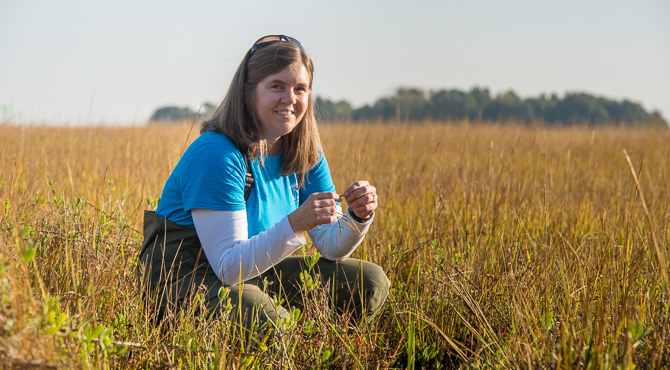is an empowering moment – especially when you’re young – to realize you can make a real change happen in the world. It was one of these moments that defined the path to success for Dr. Jessie Jarvis, Alpha Sigma Tau member. Now she is a coastal plan ecologist and assistant professor in Biology and Marine Biology Department at the University of North Carolina Wilmington.
Discovering a Passion
Growing up in Maryland, the culture of the Chesapeake Bay surrounded Jessie in daily life and in school. “I remember watching a video in middle school science class about the decline of sea grasses in the bay and how the change negatively affected the environment,” she says. “I remember thinking that I could help with that.” This small but powerful moment gave her purpose that guided her extensive education and eventual career.
Becoming a successful marine scientist was not without its
challenges. Early on, Jessie found herself surrounded by brilliant minds in
graduate school at the Virginia Institute of Marine Science at the College of William
and Mary. She also saw that women were often underrepresented in the faculty of
STEM departments. However, she was fortunate enough to find a strong mentor who
helped her and other students power through tough classes and periods of
self-doubt. “As a woman in science, I didn’t feel discouraged from my dream,”
she says, referring to the encouragement she received from her mentor. She
likens the mentor relationship to that of a Big Sister in sorority life.
“Marine science is a field full up-an-coming young women, and having that
support network is very helpful.”
Marine Science Impact
After she finished her master’s degree, her path took an unexpected turn. A massive die-off of Zostera marina, or eelgrass, shocked the lower Chesapeake Bay. “When I started studying seagrasses, people didn’t think the flowering of seagrasses was all that important,” she explains. “But one of the reasons to support long-term data projects is to study these big events and learn their true impact.” As she got more involved with monitoring and restoration, Jessie’s research turned almost entirely to seed banks and how different species of seagrass could be more maintained in their natural habitats. “It was a flue that structured my whole Ph.D.,” she says. “People don’t realize that everything from climate to nutrient and weather cycles are impacted by marine science. I wish people knew how much marine science impacts their daily lives.”

The ebb and flow of Jessie’s daily work is somewhat unique
among STEM careers. Studying seagrasses can be a race against the clock: on
days where she is working in the field, Jessie and her team are usually out
along the coast by 8 a.m. They work quickly to collect water and seagrass
samples for testing before the tide comes in. “People often ask how the
seagrass is doing,” Jessie explains. “That’s a complicated question.” To help
answer it, she evaluates nearby plants, environmental stressors, marine life,
climate change and sediment in the collected data and works to publish her
findings.
She has a couple of pieces of advice for women and recent graduates
pursuing STEM Careers. The first involves personal life balance, especially for
working mothers. “For me, family comes first,” she says. “But I’m at my second
happiest in a seagrass boat, collecting samples.” She counts herself lucky to
work for a university that stresses the importance of such a balance. “If women
are driven out of the workforce because their lives lack balance, we all miss
out,” she says.
Jessie also suggests getting as much experience in the field as possible. “No matter what it is, getting involved early,” she says, recalling how her high school environmental science club advisor, a vocal member of the Association for Women in Science, encouraged her to take trips to get a first-hand look at the field. “There is no one-size-fits-all approach to science,” Jessie cautions. “Don’t be afraid to ask for opportunities.”

